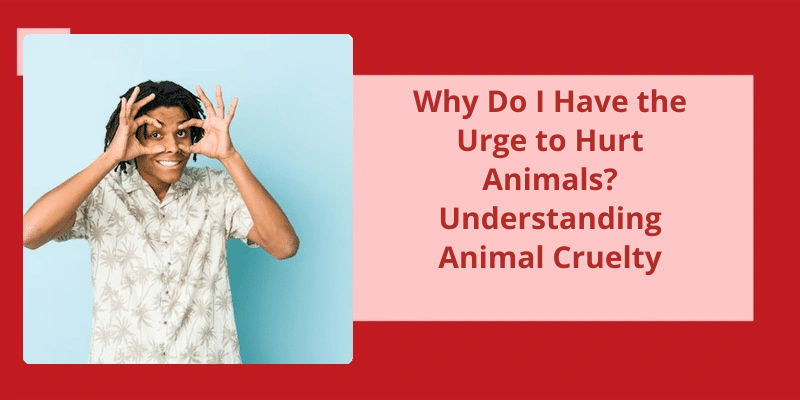There are few things more disturbing than the deliberate infliction of harm upon another living being, and yet, for some individuals, the urge to hurt animals may be a source of inexplicable pleasure. This phenomenon, commonly known as zoosadism, has long been recognized as a precursor to more serious forms of antisocial behavior, including psychopathy. Indeed, research has identified a set of behaviors, known as the Macdonald triad, that are often associated with zoosadism and seem to predict a propensity for violent behavior later in life. While the causes of zoosadism are multifaceted and complex, it’s clear that this disturbing behavior demands our attention and understanding, in order to prevent untold suffering to both animals and humans alike.
Why Do I Feel the Need to Hurt Small Animals?
However, this doesn’t mean that this behavior is acceptable or should be excused. In fact, it’s deeply concerning and should be addressed immediately. Animal cruelty is a serious issue that not only harms innocent creatures but can also be a precursor to larger acts of violence towards humans.
There are several reasons why someone may feel the urge to harm small animals. For some, it may stem from childhood trauma or abuse, while for others, it may be a manifestation of underlying mental health issues such as depression, anxiety, or sociopathy. These individuals may find solace in exerting power and control over helpless animals, which can provide a temporary sense of relief from their own emotional pain and insecurities.
Studies have shown that there’s a strong correlation between those who abuse animals and those who commit violent crimes against people. In fact, many serial killers have reported engaging in animal cruelty before moving on to more heinous acts of violence. Thus, it’s crucial that we identify and intervene in cases of animal abuse before they escalate.
Fortunately, there are many resources available for those who may be struggling with the urge to harm animals. Seeking professional help through therapy or counseling can be extremely valuable in addressing underlying emotional issues and learning healthy coping mechanisms. Additionally, there are numerous animal welfare organizations that offer education and support for those who may be struggling with animal abuse or neglect.
At the end of the day, it’s our responsibility as a society to protect our animals from harm and to intervene in cases of cruelty. Whether it involves educating ourselves and others about the warning signs of animal abuse or reporting suspected cases to law enforcement, we must take action to ensure the safety and well-being of our furry friends. By doing so, we can’t only prevent harm to innocent animals but also potentially prevent larger acts of violence against people.
The Psychological Effects of Animal Abuse on the Abuser
- Increased risk of depression and anxiety
- Higher likelihood of engaging in violent behaviors
- Desensitization to cruelty and suffering
- Decreased ability to feel empathy towards others
- Increased likelihood of substance abuse
- Development of psychological disorders such as PTSD
- Higher risk of being involved in criminal activity
- Difficulty maintaining healthy relationships with others
It’s a well-known fact that animal cruelty is a serious concern that demands our attention. One aspect that often remains unexplored is why some children resort to hurting animals. While there may be several reasons behind this behavior, the most common ones involve past experiences, development-related curiosities, or peer pressure. Let’s delve deeper into these motivations and understand how we can prevent such incidents from occurring.
Why Did I Hurt Animals When I Was a Kid?
While most of these children don’t grow up to become violent criminals, research shows that there’s a high correlation between animal abuse and other forms of aggression, including physical violence. As such, it’s crucial for parents, caregivers, and educators to intervene early and provide children with appropriate guidance and supervision.
In my case, I remember feeling a sense of power and control when I hurt animals. It was a way for me to exert dominance and feel a sense of superiority over another living being. Looking back, I realize that this behavior was likely a result of unresolved anger, frustration, and other emotional issues that I was experiencing at the time.
Furthermore, I’d never learned appropriate ways to express my emotions or handle conflict, which made it easier for me to lash out at animals. Additionally, I didn’t fully understand the consequences of my actions and the impact they could have on the animals physical and emotional wellbeing.
As I grew older and received proper guidance and support from caregivers, my behavior towards animals changed. I learned about empathy and compassion and the importance of treating all living beings with respect and kindness. I understand now that hurting animals is never an appropriate or acceptable way to cope with emotions or handle conflict.
While the motivations behind animal abuse can vary from child to child, it’s important to address this behavior as soon as possible and provide children with the appropriate guidance and support needed to understand the gravity of their actions. It’s also key that parents and caregivers get to the root of the behavior and seek professional help if necessary. By doing so, these children can receive the help they need and become responsible, compassionate adults who treat all living beings with kindness and respect.
What Are the Warning Signs That a Child May Be Prone to Animal Abuse, and What Can Parents and Caregivers Do to Prevent It?
- Showing aggression towards animals, such as hitting or kicking them
- Displaying a lack of empathy towards animals, or not showing concern for their welfare
- Intentionally harming animals, such as pulling their tails or wings
- Talking about hurting animals or wanting to see them get hurt
- Obsessively watching violent videos or shows featuring animal abuse
- Isolating themselves from others and preferring the company of animals over people
- Getting involved in animal fighting or other illegal activities involving animals
- Exhibiting other signs of emotional or behavioral issues, such as depression, anxiety, or aggression towards people
Parents and caregivers can take several steps to prevent animal abuse in children, such as:
- Teaching empathy and compassion towards animals from an early age
- Supervising interactions between children and animals to ensure they’re safe and appropriate
- Encouraging children to report any incidents of animal abuse or suspected abuse
- Modeling positive behavior towards animals, such as gentle handling and providing proper care
- Seeking professional help if a child shows signs of emotional or behavioral issues
- Providing education about the importance of animal welfare and the consequences of animal abuse
Therefore, it’s important to understand the full extent to which animal cruelty affects animals, including how it impacts their mental wellbeing. While it may be difficult to comprehend the level of suffering that animals endure, it’s crucial that we acknowledge and take action to address this issue.
How Does Animal Cruelty Affect Animals Mentally?
Animals who experience cruelty often suffer from stress and trauma, causing deterioration of their mental and emotional health. They may become fearful, anxious, and depressed. This can result in behavior changes such as aggression, self-harm, and withdrawal. This can have lifelong consequences that greatly impact their quality of life.
Physical abuse, neglect, and incarceration also take a toll on animals. They may experience bouts of sickness and injury due to these conditions. Prolonged exposure to these circumstances can lead to a weakened immune system, and secondary illnesses that are painful and uncomfortable. Additionally, animals who experience social isolation or confinement suffer from a lack of stimulation, which can lead to anxiety and psychological disorders. These conditions require intensive medical attention and can be very difficult to treat, often with lifelong consequences.
Animals may become more aggressive, which can result in serious consequences for humans and other animals. Additionally, they may become withdrawn or submissive, making them easy targets for other animals, or vulnerable to abuse from humans. These negative behavioral changes can persist long after an animal is removed from a cruel situation, making it difficult and sometimes impossible to reintroduce them to society.
Animal cruelty has devastating consequences for animals, including significant mental health problems that can have lifelong consequences. It’s our duty to prevent cruelty and to protect animals from harm. Through education, raising awareness, and by implementing stricter animal welfare laws, we can help reduce the incidence of animal cruelty, and promote a better understanding of their emotional and psychological needs. By working together, we can provide these beautiful creatures with the love, care, and respect they deserve.
Furthermore, animal cruelty can have lasting effects on both animals and humans. Research has shown a clear link between animal abuse and violence towards humans, as many perpetrators of violent crimes against people have a history of animal cruelty. It’s important to understand the gravity of mistreating animals and the impact it can have on society as a whole.
Why Is It Bad to Mistreat Animals?
Not only does animal cruelty harm the individual animal, but it also has a ripple effect on the larger networks of animals in the same community. For example, in cases of puppy mills or animal hoarding, a large number of animals may be kept in cramped and unsanitary conditions, resulting in an increased risk of disease and spreading of infections. Additionally, the emotional distress caused by neglect and abuse can have long-lasting effects, even upon animals that eventually find loving homes.
In addition to the ethical concerns surrounding animal cruelty, there are also economic considerations to take into account. Animal welfare organizations and shelters spend millions of dollars each year caring for abused and neglected animals. This money could otherwise be used to promote animal adoption, spay and neuter programs, and other initiatives to prevent animal cruelty in the first place.
Finally, our treatment of animals reflects upon us as a society. We consider ourselves to be compassionate and civilized, yet we allow such cruelty to occur. By taking a stand against animal cruelty, we’re affirming our values of compassion, respect, and empathy. As Mahatma Gandhi famously said, “The greatness of a nation can be judged by the way it’s animals are treated.”
By recognizing the harm caused by mistreatment of animals and taking steps to prevent it, we can ensure a more compassionate and just future for all living beings.
The Psychological Effects of Animal Abuse on Humans Who Commit These Acts.
- Decreased empathy towards animals
- Increased likelihood of developing violent behavior
- Increased risk of developing mental health disorders such as depression and anxiety
- Increased risk of engaging in substance abuse
- Increased risk of developing personality disorders such as antisocial personality disorder
- Increased likelihood of experiencing interpersonal difficulties such as difficulty forming healthy relationships
Source: Why is animal abuse a bad thing?..
Conclusion
It’s crucial for individuals who struggle with this urge to seek professional help and support in order to address the underlying issues that contribute to their behavior. In addition, society must continue to address and educate on the importance of animal welfare and the consequences of cruelty towards animals. Ultimately, it’s our responsibility to create a safer and more humane world for all living beings.






